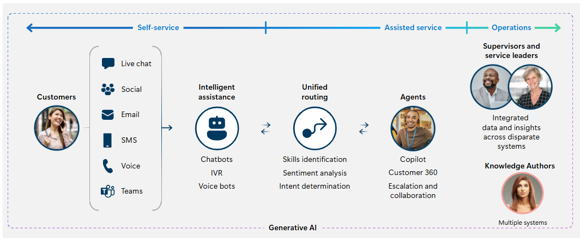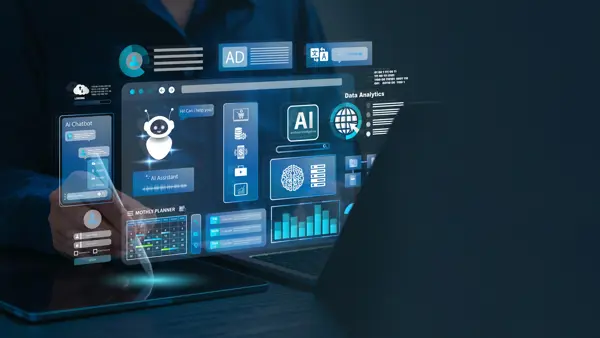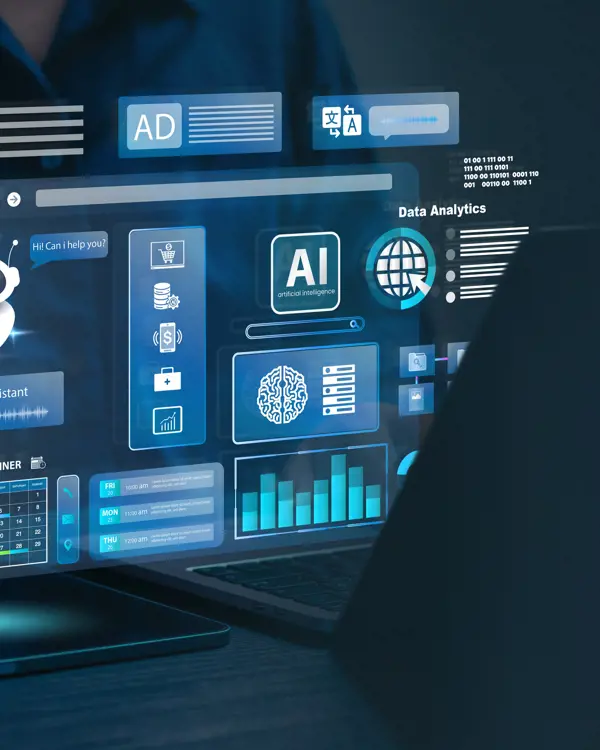Table of Contents
Mastering Customer Expectations: How a Contact Center as a Service (CCaaS) Solves Your Service Challenges
Unlock valuable insights by reading the eBook.

What is a Contact Center as a Service?
2The Microsoft Strategy for CCaaS
3Cloud-Based Security: Data Protection & AI in the Microsoft Ecosystem
4HSO and Dynamics 365 Contact Center
What is a Contact Center as a Service?
A Contact Center as a Service (CCaaS) is a cloud-based platform that combines all the functions of a modern contact center in a central and easily scalable environment while making processes more efficient through AI and automation. Why is this so important?
The status quo of customer service
Think back to the last time you were in contact with your insurance company, your telephone provider, or an online mail order company. You'd probably prefer to solve your problem quickly yourself - but instead, you encounter primitive chatbots or a maze of automated telephone menus.
And when you finally do want to speak to someone, you end up in long queues, are put on hold several times and have to explain your request again and again.
These service gaps cost companies hard cash. With self-service deflection rates of less than 45%, companies miss the opportunity to resolve issues efficiently, leading to an excessive workload for service employees. And this is where the next crisis comes in: the turnover rate of service employees is up to 45%.
The financial impact of inefficient customer service is significant: it is estimated to cost around 3.7 trillion dollars a year worldwide. Where does the service gap come from? It is largely due to the existing infrastructures in contact centers, which cause numerous points of friction and inefficiencies.
The main problems lie in:
- Outdated technologies that lead to slow response times and limited scalability
- Isolated systems that prevent the flow of information between channels
- Lack of automation and manual processing of simple requests
- Unstructured and incomplete customer data, which makes personalization and decision-making processes more difficult
All in all, these factors increase your operating costs and impair service quality and customer satisfaction. This is exactly what a Contact Center as a Service solves. It combines all the important functions that modern customer service needs to work efficiently and in a customer-oriented manner. When all these components interlock, the result is a seamless end-to-end service solution.
Core Components of a Modern Contact Center as a Service
- 1
Omnichannel Management and 360-Degree Customer View
Customers expect to be able to communicate with companies via the channel of their choice. That's why a CCaaS provides a complete overview of customer history across all communication channels. Information and contexts are available at all times, allowing customers to switch channels flexibly without having to re-enter data or interaction histories.
- 2
AI-Supported
The automation of routine tasks relieves the burden on customer service and speeds up processes. With a CCaaS, chatbots and voicebots answer simple questions around the clock. Artificial intelligence supports human agents with real-time suggestions and recommendations for action.
- 3
Self-Service Functions
Many customers want to solve simple issues themselves without having to contact an agent directly. A CCaaS offers tools such as knowledge databases, chatbots, and self-service portals for this purpose. The advantage: customers save time, you save money, and your service team can focus on other priorities.
- 4
Security and Compliance Management
The protection of sensitive customer data is and remains a key aspect of customer service. And the use of AI is currently causing many companies headaches. This makes it all the more important that compliance, data protection, and data security are considered and integrated into CCaaS solutions from the outset. Trustworthy providers meet international compliance standards and are ISO 27001-certified, for example.
- 5
Unified Routing
In a modern CCaaS, requests are intelligently forwarded to the best qualified and available agent - based on criteria such as skills, availability or urgency. This reduces waiting times and ultimately ensures greater customer satisfaction.
- 6
Real-Time Analytics and Reporting
Powerful CCaaS solutions analyze customer and operational data in real time, identify trends and create detailed reports. This enables companies to proactively respond to customer needs and continuously improve service quality.
- 7
Cloud-Based Scalability
Cloud-based customer service solutions have long been the standard, but we include this point for the sake of completeness. CCaaS systems are always cloud-based and therefore enable rapid scaling. As a result, companies use resources efficiently and only pay for what they need.
The Microsoft Strategy for CCaaS
Microsoft is the only leading CRM provider with a fully integrated CCaaS solution that combines native voice and omnichannel capabilities, AI-powered automation, and CRM in a unified platform.
Thanks to the deep integration with Dynamics 365, Microsoft Teams, Power Platform, and Azure Communication Services, there is no need to switch to third-party solutions - everything works within a unified ecosystem.
Microsoft Copilot supports self-service functions, helps agents process complex requests, and enables a higher first resolution rate thanks to intelligent routing mechanisms. The result is an end-to-end service process supported by AI.
At the same time, the cloud-based security architecture ensures data protection and compliance without requiring companies to manage their own infrastructure. Regular updates and innovations always give companies access to the latest technologies.
Functions & Technology Components
The Dynamics 365 Contact Center is provided via Microsoft Azure and enables omnichannel interactions via Azure Communication Services - including voice, SMS, web chat, social media, WhatsApp, and Microsoft Teams.
At the same time, the Power Platform with low-code tools and automation functions ensures that companies can implement individual adaptations and workflows themselves. Thanks to a large number of preconfigured and customizable connectors, Microsoft CCaaS can also be integrated into existing third-party CRM, ERP, or ticketing systems.
The Dynamics 365 Contact Center offers a 360-degree view of the customer by centralizing all interactions and providing them in a unified agent workspace.
Core Function | Microsoft Technology | Description |
Omnichannel management | Azure Communication Services, Microsoft Teams, WhatsApp, Facebook Messenger, Apple Messages | Enables customer communication via various channels (voice, SMS, webchat, social media, Microsoft Teams) with seamless channel switching. |
AI-supported automation | Copilot Studio, Azure AI, Nuance Conversational AI | Use of generative AI for self-service, chatbots, voicebots and conversational IVR. Agent Assist supports employees with real-time suggestions and automated call summaries. |
Intelligent routing engine | Unified routing, AI-driven decision-making | Automatic assignment of requests based on customer history, sentiment analysis, agent skills and availability. |
Agent desktop & workflows | Dynamics 365 Customer Service, Microsoft Teams, Copilot, Power Automate | Unified workspace with 360-degree customer view, knowledge database and CRM integration. Copilot generates call summaries and suggestions. |
Real-time analytics & reporting | Power BI, AI Insights, Sentiment analysis | Real-time dashboards for KPI monitoring, sentiment analysis and trend forecasts. Supervisor tools offer live monitoring and intervention options. |
Omnichannel Engagement with Conversational AI and AI-Powered Self-Service
Just a few years ago, contact centers relied heavily on manual processes with rudimentary automation. However, customer service has evolved rapidly in recent years. Currently, 65% of service professionals already use AI regularly, and by 2027, companies are expected to spend 143 billion dollars on AI-supported solutions.
In line with this trend, AI is at the heart of the Dynamics 365 Contact Center and drives almost all of the platform's core functions. This is particularly evident in the following three areas:
Cloud-Based Security: Data Protection & AI in the Microsoft Ecosystem
Companies are rightly asking themselves this question: How secure is my customer and company data?
The increasing integration of generative AI in the contact center not only brings efficiency gains, but also new security and data protection requirements. Companies are rightly asking themselves questions: How secure is customer and company data? Where is it processed? And how does Microsoft ensure that sensitive information does not flow into public AI models?
Microsoft addresses these concerns with a multi-level security architecture based on data isolation, transparency and global compliance
- Company data remains protected: Microsoft's generative AI in Copilot for Service runs in a closed system that does not use customer data to train public AI models.
- Data processing in secure Microsoft data centers: All data is processed in ISO 27001 and GDPR-compliant Azure regions - within the EU or in specific countries on request to comply with data protection guidelines.
- Zero Trust security model: Access to sensitive data is based on multi-level authentication, identity management and role-based authorizations - only authorized users can access certain information.
- Encryption at all levels: Customer data is encrypted end-to-end during storage and transmission and additionally secured by Microsoft Defender for Cloud.
- Real-time monitoring and compliance: AI-supported security analyses detect suspicious activities at an early stage and ensure automatic threat prevention. Companies also have full control over audit logs, data protection guidelines and governance tools.
Microsoft is a leader in cloud security and AI-powered data protection, so companies automatically benefit from a highly scalable, robust security infrastructure - without having to develop or manage complex security architectures themselves.
HSO and Dynamics 365 Contact Center
HSO and Dynamics 365 Contact Center
It doesn't matter whether you are already deeply rooted in the Microsoft ecosystem or use an existing contact center or CRM solution. Thanks to Azure Communication Services and the Power Platform, omnichannel functions, automation and AI-supported routing can be flexibly integrated into your existing IT landscape.
The benefits of a modern, AI-supported contact center are obvious: faster processes, better customer experiences, and more efficient use of resources.
They are underpinned by Microsoft's own transformation in the support area. With Copilot in Dynamics 365 Customer Service, Microsoft was able to achieve 20% fewer misroutes, a 31% higher first-time resolution rate and up to 16% faster processing of chat requests. At the same time, support teams are able to process more requests. These figures show: AI and automation are not a topic for the future - they are already delivering measurable success today.
Curious about how your company can benefit from this? There are various ways with HSO: from proof-of-concept projects and pilot applications in individual areas to company-wide implementation - we support you in using the solution strategically. Our approach ensures that you benefit from the added value quickly, without long implementation times.
It doesn't matter whether you are already deeply rooted in the Microsoft ecosystem or use an existing contact center or CRM solution. Thanks to Azure Communication Services and the Power Platform, omnichannel functions, automation and AI-supported routing can be flexibly integrated into your existing IT landscape. This means you can also introduce Microsoft CCaaS gradually without replacing existing systems.
Let's find out together how your company can best benefit from Microsoft CCaaS. Contact us for a personal consultation or a live demo and find out how you can make your customer service more efficient, intelligent and future-proof.
Contact Us for a Personal Consultation
Learn more about Dynamics 365 Contact Center
Learn More
Contact Center Resources












